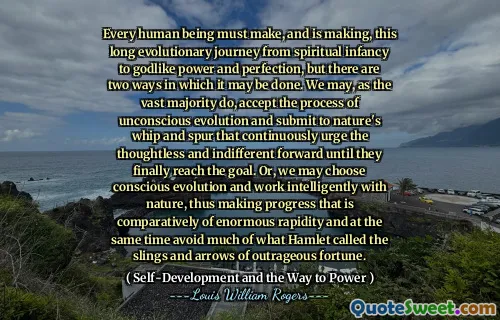
Every human being must make, and is making, this long evolutionary journey from spiritual infancy to godlike power and perfection, but there are two ways in which it may be done. We may, as the vast majority do, accept the process of unconscious evolution and submit to nature's whip and spur that continuously urge the thoughtless and indifferent forward until they finally reach the goal. Or, we may choose conscious evolution and work intelligently with nature, thus making progress that is comparatively of enormous rapidity and at the same time avoid much of what Hamlet called the slings and arrows of outrageous fortune.
The journey of human evolution involves a progression from a state of spiritual infancy toward achieving godlike power and perfection. This journey can unfold in two distinct ways. Most individuals succumb to unconscious evolution, allowing nature to dictate their path, guided by external forces that drive them forward regardless of their awareness or intention.
Alternatively, one can opt for conscious evolution, which involves a deliberate and intelligent alignment with natural processes. This proactive approach can significantly accelerate personal growth and help individuals navigate life's challenges more effectively, thus minimizing unnecessary suffering and turmoil along the way.






